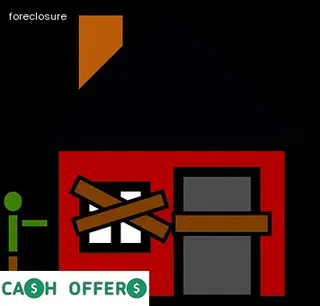Indiana has a specific timeline that must be followed when it comes to foreclosures. Knowing the timeline is important for anyone facing foreclosure in Indiana, as it provides insight into the steps and process of foreclosure in the state.
It begins with the lender filing a complaint and summons with a court, which then must be served to the borrower. The borrower then has 30 days to answer or contest the foreclosure, otherwise they waive their right to do so.
If an answer is filed within this time frame, the court will then set a hearing date and issue an order for discovery. At this point, if no resolution has been reached between parties, a public sale may occur after all other requirements are fulfilled, such as posting notice of sale for several weeks prior to sale date and publishing notice in local newspaper.
Lastly, title will transfer from borrower to buyer at public sale or through agreement. Understanding Indiana’s foreclosure laws and procedures can help borrowers prepare accordingly and ensure that their rights are protected throughout the process.

When it comes to the process of foreclosure in Indiana, understanding mortgage loans is a key component. To understand the timeline of foreclosure in this state, it’s important to understand what a mortgage loan entails.
In Indiana, a mortgage loan is a loan given by a financial institution or bank that allows individuals to purchase real estate such as a home or land. The individual then pays the loan back, plus interest, over an agreed period of time.
A lien is placed on the property so that if payments are not made, the lender can repossess the property and sell it to recover their losses. This process is known as foreclosure and can take some time depending on various factors such as how quickly paperwork is filed with the court system and any special circumstances surrounding the case.
Knowing all aspects of mortgages and foreclosures in Indiana can help one better understand how long they should expect this process to take.
The timeline for a home foreclosure in Indiana can vary greatly depending on the situation. The preforeclosure process typically begins when the homeowner is unable to make their mortgage payments and is notified that they are in default.
From there, the lender will typically file a Notice of Default and then a Notice of Sale with the local court. This usually takes around two months, after which the homeowner has 90 days to bring their payments up to date or risk foreclosure.
During this period, homeowners may be able to take advantage of programs such as forbearance agreements, loan modifications, or other repayment plans to help them keep their homes. However, if these options are not taken advantage of within the 90 days, then the lender will proceed with foreclosure proceedings and auction off the home at public sale.
Once this is done, it again typically takes around two months before ownership of the home transfers from the previous owner to its new owners.

Once a breach letter has been issued, the homeowner is legally obligated to respond within 30 days. If they fail to respond or do not have an approved payment plan in place, the lender may begin the foreclosure process by filing a Notice of Default (NOD).
This will officially start the timeline for foreclosure proceedings, which typically last around 90 days from the NOD filing date. During this time period, the lender will continue to contact the homeowner and attempt to negotiate a settlement agreement.
However, if no agreement can be reached, then a Sheriff Sale will be scheduled. The Sheriff Sale is when the property is sold to another party at public auction.
Following this sale, possession of the property must be given to its new owner within 10 days. It is important to remember that each step of the foreclosure process takes time and can vary from one state to another depending on local laws and regulations.
Knowing the timeline of a foreclosure in Indiana is critical to those facing foreclosure, as it could mean the difference between keeping or losing their home. Before a foreclosure sale takes place, homeowners may have one last chance to reinstate their mortgage by paying back all missed payments and fees.
Homeowners must act quickly to reinstate the mortgage before the foreclosure sale within a certain period of time, which varies depending on the county. In Indiana, this can range from 21 to 31 days — you must find out specific details from your lender or mortgage servicer.
Fortunately, some lenders are willing to work with borrowers who are experiencing financial hardship and offer loan modifications or other options like forbearance plans that enable them to stay in the property and pay back overdue amounts over a longer period of time. It is important for homeowners to keep their communication lines open with their lender during this process, as well as contact legal aid organizations for additional advice and assistance.
Ultimately, understanding the foreclosure timeline in Indiana can help struggling homeowners make decisions that could save their homes from foreclosure.

When it comes to Indiana foreclosure, one of the most important aspects for homeowners to consider is the state’s deficiency judgment laws. This law dictates whether creditors may seek a deficiency judgment from homeowners who are unable to pay off their mortgage due to a foreclosure.
Homeowners in Indiana have certain rights, including the right to redeem their property within a certain time period or to challenge the creditor’s claim and obtain a waiver of any deficiency judgment. Knowing these rules can help protect homeowners from being held responsible for the full balance of their loan after foreclosure.
Additionally, understanding Indiana’s foreclosure timeline is essential for knowing when homeowners must take action in order to avoid a deficiency judgment. Therefore, uncovering the Indiana foreclosure timeline and learning about homeowner rights are key steps that can help ensure that homeowners are fully informed of their rights and obligations throughout the process.
It is possible to stop a foreclosure in Indiana, but the timeline for this process can vary. Depending on the situation, it might take months or even years for a homeowner to be able to prevent a foreclosure from occurring.
It is important to have an understanding of the timeline before taking any steps to try and stop the foreclosure. There are multiple resources available that can help homeowners uncover the Indiana Foreclosure Timeline and understand how long it may take them to stop a foreclosure in their state.
Homeowners should consult with an attorney or financial advisor who can provide advice on how they can best navigate through their situation and protect their home. Additionally, there are state and federal programs that may offer assistance with mortgages and other related costs which could also help in stopping a foreclosure in Indiana.

In Indiana, when a homeowner fails to make payments on their mortgage, it can lead to foreclosure. The timeline for the foreclosure process varies based on the particular circumstances of each case.
Generally, however, after a foreclosure sale has taken place, there is no redemption period in Indiana during which the homeowner can reclaim their home. This means that once the property has been sold at auction, the new owner immediately takes possession.
This differs from some other states where homeowners are afforded a period of time to redeem their property even after it has been sold at auction. Although this may seem harsh, the lack of a redemption period in Indiana helps the lender and buyer move forward with certainty and ensures that homeowners have clear expectations about what will happen if they fall behind on their payments.
It also serves as an incentive for borrowers to take action sooner rather than later to avoid falling into foreclosure.
The public notice requirements for a foreclosure sale are an important component of the Indiana foreclosure timeline. Homeowners must be given proper notice before their home can be sold at auction, which is done through a public advertisement.
This advertisement must include the date of the sale, the time and location of the sale, and a description of the property that is being foreclosed upon. The notice must also specify whether or not it will be a judicial or nonjudicial sale as well as any other special terms of the sale.
Furthermore, this advertisement must be published in a local newspaper at least three consecutive weeks prior to the actual sale and posted in one or more public places in the county where the property is located. It is essential that homeowners understand these requirements so they can take appropriate action when needed and know what to expect when facing a foreclosure situation.

If you have missed a mortgage payment in Indiana, there are several options available to you. The most important thing to do is contact your lender as soon as possible.
They may be able to help you find solutions such as deferment of payment, loan modification, or forbearance. You should also research other available assistance programs like the Indiana Hardest Hit Fund or the Indiana Foreclosure Prevention Network that may be able to provide assistance with making payments or helping with foreclosure prevention counseling.
Additionally, if all else fails and foreclosure appears imminent, it’s important to understand the timeline of foreclosure proceedings in Indiana so that you know what to expect and how long it will take for the process to conclude.
In the state of Indiana, homeowners who have received an initial preforeclosure notice from their lender should take immediate action. It is important to understand that a preforeclosure notice is not a foreclosure itself, but rather a warning that one may be coming soon if certain conditions are not met.
In Indiana, the timeline for foreclosure varies depending on the situation and type of loan. Homeowners need to respond promptly and work with their lender in order to prevent foreclosure proceedings from occurring.
Doing so will give them more time to come up with realistic payment plans that may help avoid the foreclosure process altogether. Homeowners should also consult with a lawyer or housing counselor who can provide advice and assistance in negotiating with their lender.
Knowing how to respond appropriately and in a timely manner is essential when dealing with an initial preforeclosure notice from your lender in Indiana.

The court plays a significant role in the Indiana foreclosure process. The state requires lenders to file a lawsuit in order to initiate foreclosure proceedings.
The court must then issue an Order of Sale, which is a document that permits the lender to sell the property at public auction. After the sale has been conducted and approved by the court, it will issue a Judgment of Foreclosure and Sale, which states that the lender is now the owner of the property.
If no one purchases the home at auction, there may be additional steps taken by the court before it issues an Order for Possession, which allows the lender to take possession of and evict any occupants from their home. The entire foreclosure process can take anywhere from three months up to two years depending on how quickly a resolution can be reached between all parties involved.
Filing an objection to a foreclosure action in Indiana is an important step for homeowners who are facing the potential of losing their home. Before taking this step, it is essential to understand the timeline for foreclosure proceedings in Indiana.
While the exact timeline varies from case to case, there are certain steps that must occur before a foreclosure can be finalized. To begin, lenders must provide written notice of their intent to foreclose and must wait at least 30 days before beginning proceedings.
This gives homeowners time to assess their options and respond if they choose to do so. Homeowners can either file an objection or take no action; however, filing an objection can give homeowners more control over the situation as they may be able to negotiate a repayment plan or other alternative solutions with the lender.
Objections must be filed in writing and should include any relevant evidence that supports the homeowner’s claim. After objections are submitted, lenders will review them and may agree to modify loan terms or extend the timeline.
If not, foreclosure proceedings will continue and eventually result in a court order authorizing the sale of the property; at which point homeowners will have 10 days to vacate and pay all outstanding fees related to the foreclosure process.

Preparing for a foreclosure hearing in Indiana can seem overwhelming, but it does not have to be. It is important to know the timeline of the foreclosure process and what steps you can take to prepare for your hearing.
Start by reviewing the Notice of Default and Right to Cure that outlines the timeline of your foreclosure. You should also review any other documents sent from your lender or servicer that provide details about your loan, payments, and other relevant information.
Additionally, it is helpful to have an understanding of Indiana’s foreclosure laws and regulations so you can be aware of your rights during the hearing. Lastly, if you are able to, seek out legal advice so that you fully understand the proceedings and can properly represent yourself at your hearing.
With this knowledge in hand, you can make informed decisions throughout the process and ensure that all parties involved adhere to state guidelines.
Homeowners in Indiana facing foreclosure often make common mistakes throughout the process that can delay the timeline and even increase their costs. For instance, many fail to take action upon receiving their initial foreclosure notice and continue to miss payments, which can significantly extend the timeline.
Additionally, failing to respond to notices from lenders or attend court hearings can also result in a longer timeline as well as additional fees. Furthermore, some homeowners try to negotiate with their lender themselves instead of hiring an attorney who is well-versed in foreclosure law, leading to potential costly errors down the line.
Understanding these common pitfalls and avoiding them is essential for homeowners hoping to speed up the Indiana foreclosure timeline.
In Indiana, the timeline for foreclosure can vary depending on the amount of payments that have been missed. Generally, if a homeowner is three or more payments behind on their mortgage, they are considered to be in default and at risk of foreclosure.
In Indiana, lenders must wait at least two months after a homeowner is declared in default before initiating legal action. This means that it typically takes about five months from the time when homeowners become delinquent on their mortgage to when lenders can take action to begin the foreclosure process.
However, some lenders may take even longer and certain circumstances may also increase this timeline. Ultimately, it is important for homeowners to stay up-to-date with their mortgage payments so that they do not reach this point in the first place.

In the state of Indiana, a homeowner must be at least two months behind on their mortgage payments before they go into foreclosure. This timeline can vary depending on the lender, but typically lenders will begin the foreclosure process once a homeowner is two months behind in payments.
The lender will then send a letter to the homeowner informing them that they are in default. It is important to note that even if a homeowner only has one delinquent payment they could still be at risk of foreclosure if their lender views it as an indication that there will be future delinquencies.
After this letter is sent, the lender may wait up to four additional months before beginning the legal process of foreclosure. During this time, homeowners should work with their lender to find solutions that can help them avoid going into foreclosure.
If these solutions do not work, then the legal foreclosure process may begin and it could take anywhere from three to six months for it to reach its conclusion.
For many people, the thought of foreclosure can be a frightening one. But while it may feel like an insurmountable challenge, there are ways to recover from a foreclosure in Indiana.
While Indiana has its own timeline for foreclosures, understanding the process and knowing what resources are available can help borrowers and homeowners make informed decisions about their situation. With the right guidance and support, individuals facing foreclosure in Indiana can learn how to successfully navigate the process and find relief from their financial obligations.
There is hope after foreclosure: with proper planning and assistance, Indiana homeowners have the potential to rebuild their credit scores and finances over time. Furthermore, local organizations exist to provide counseling services that can help Hoosier homeowners understand their options and better prepare for the road ahead.
By taking advantage of these services, those who have experienced foreclosure may still be able to achieve long-term financial security.
In Indiana, the statute of limitations for foreclosure is typically 10 years from the date of default. The lender must file a complaint within that timeframe in order to enforce their right to collect the debt.
If a foreclosure is not filed before this 10-year period expires, then the lender loses their ability to collect the mortgage debt. This means that the homeowner may be able to keep their property without having to make any further mortgage payments.
However, it is important to note that even after the statute of limitations has expired, lenders may still pursue other forms of legal action such as suing for a deficiency judgment or filing a lien on the property. Therefore, it is important for homeowners facing foreclosure to understand their rights and take appropriate steps to protect themselves during this process.